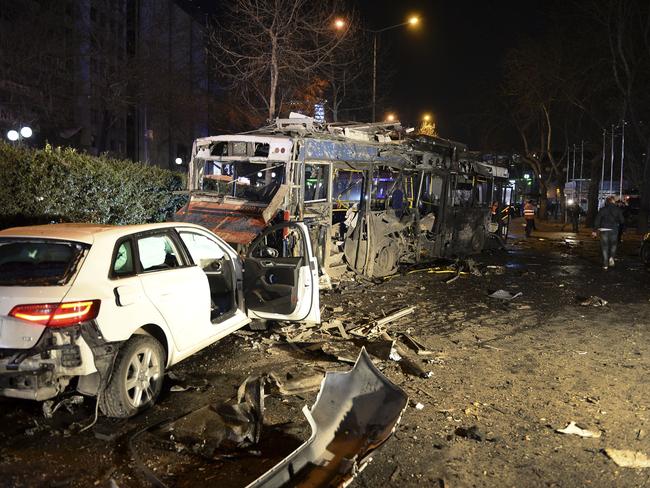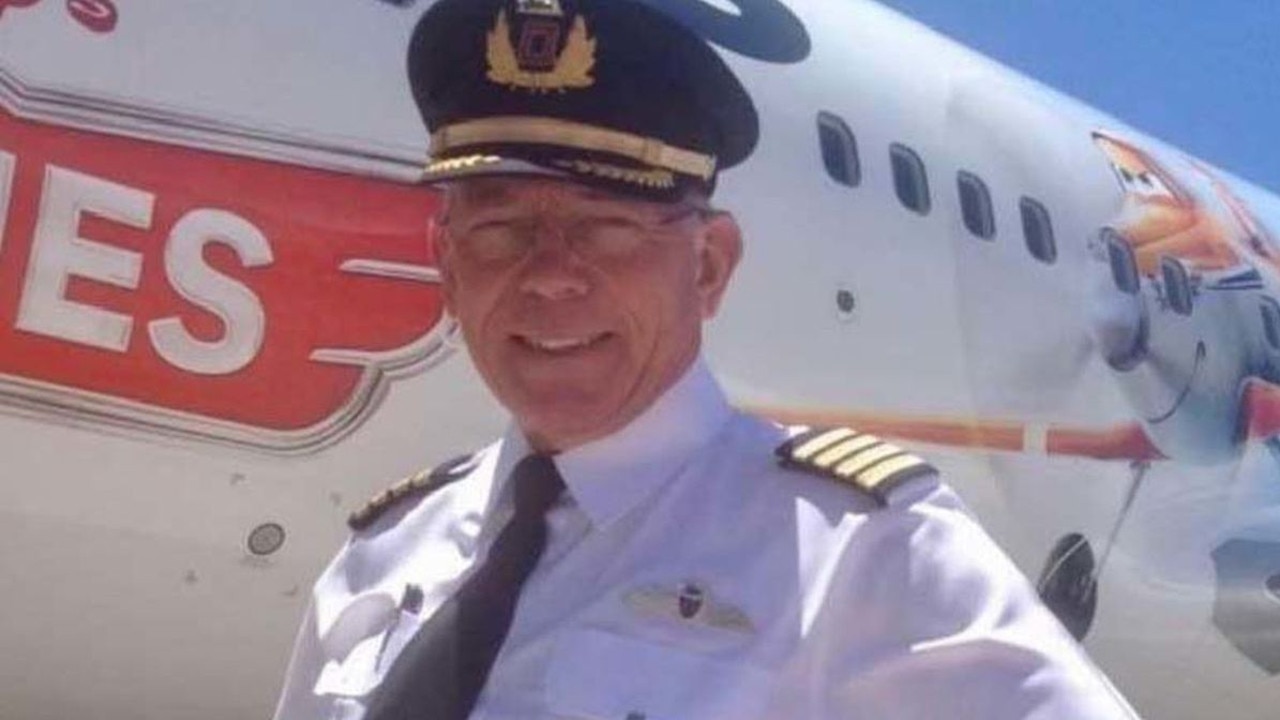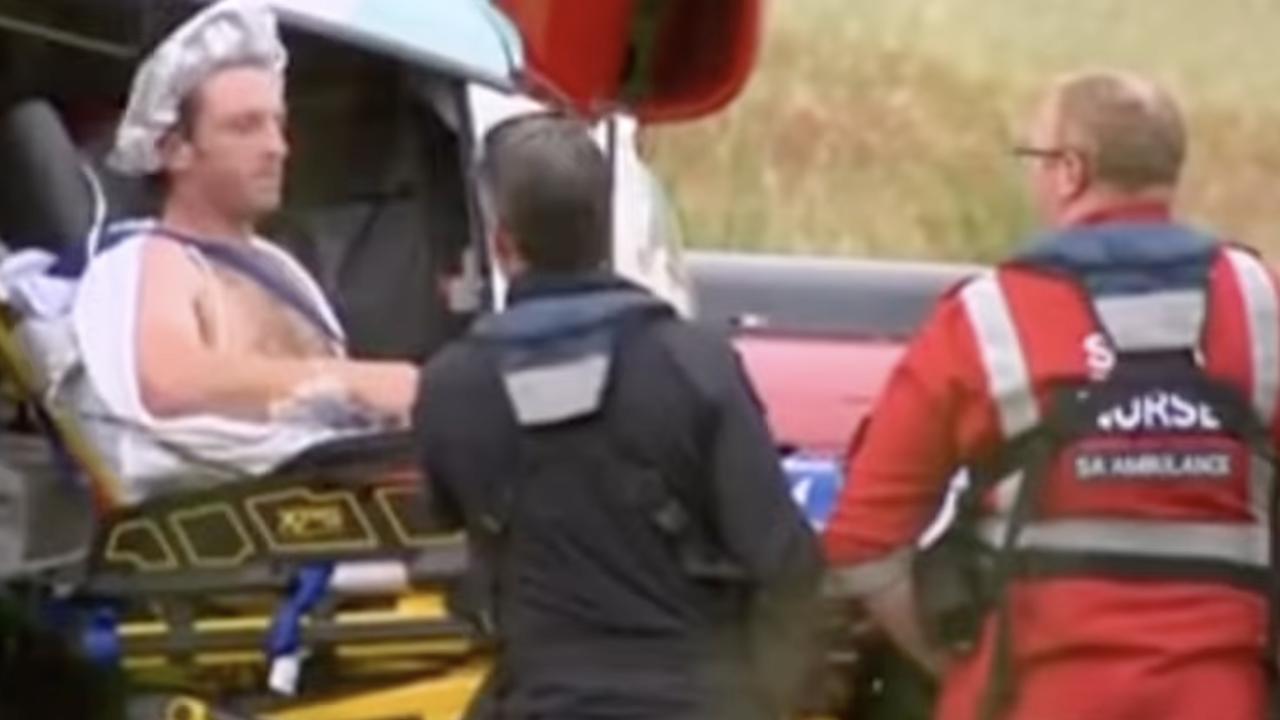Explosion rips through Turkey’s capital killing dozens and wounding hundreds
AUSTRALIA’S Ambassador to Turkey tells how he was metres away from the Ankara car bomb blast that killed at least 37 people. WARNING: Graphic.
AUSTRALIA’S Ambassador to Turkey has told of how he was just metres away from the car bomb blast in the heart of Turkey’s capital Ankara that killed at least 37 people, injuring 125 more with 19 of those in a critical condition.
Turkey’s air force retaliated immediately, hitting 18 sites of the Kurdistan Workers’ Party, or PKK in northern Iraq, including the Qandil mountains where the group’s leadership is based, the state-run Anadolu Agency reported.
Police meanwhile carried out raids in the southern Turkish city of Adana, detaining suspected PKK rebels. The private Dogan news agency said at least 36 suspects were taken under custody. Fifteen suspected Kurdish militants were also detained in Istanbul, Anadolu said.
Ambassador James Larsen said he was driving his daughter back home from horseriding lessons and had stopped at traffic lights in the heart of the city.
“The explosion took place just across the other side of the traffic lights,” he told the ABC’s 7.30 Report.
“We heard a pop and we saw flames shooting up and a bus and car catching alight and flames spreading out. It was very distressing.”
Mr Larsen told his daughter to put her head down low towards the car floor to protect her from any flying debris.
“I moved the car to the side of the roadway and called the office to make sure that we initiated our crisis procedures,” he added.
The car bombs targeted buses and people waiting at bus stops.
A senior government official told The Associated Press that authorities believe the attack was carried out by two bombers — one male, one female — and was the work of Kurdish militants. He spoke on condition of anonymity because the investigation is continuing.
It was the second deadly attack blamed on Kurdish militants in the capital in the past month and President Recep Tayyip Erdogan vowed to bring “terrorism to its knees.”
“These attacks, which threaten our country’s integrity and our nation’s unity and solidarity, do not weaken our resolve in fighting terrorism but bolster our determination,” President Erdogan said.
The explosives were the same kind as those used in a February 17 attack and the bomb had been reinforced with pellets and nails to cause maximum damage, the source told Reuters.
One security official said the car used in the attack was a BMW driven from Viransehir, a town in the largely Kurdish southeast.

The blast came as Turkey’s security forces were set to launch large-scale operations against militants in two mainly Kurdish towns — Yuksekova, near the border with Iraq and in Nusaybin, which borders Syria — after authorities imposed curfews in the towns, prompting some residents to flee. The military deployed large numbers of tanks near the towns as the curfews were announced.
Authorities on Monday announced another curfew, to go into effect at 10am Tuesday (AEST) in the city of Sirnak, near the border with Iraq, signalling that the military was also preparing to battle Kurdish militants there.
Turkish authorities banned Twitter and Facebook after images spread on the social media sites showing the aftermath of the attack, RT News reported.
Turkey’s telecommunications authority, TIB, blocked access to social media after a court-ordered ban was imposed. Some Turkish users have bypassed the restrictions using VPN accounts.

The blast came as Turkey’s security forces were set to launch large-scale operations against militants in two mainly Kurdish towns — Yuksekova, near the border with Iraq and in Nusaybin, which borders Syria — after authorities imposed curfews in the towns, prompting some residents to flee. The military deployed large numbers of tanks near the towns as the curfews were announced.
Authorities on Monday announced another curfew, to go into effect at 10am Tuesday (AEST) in the city of Sirnak, near the border with Iraq, signalling that the military was also preparing to battle Kurdish militants there.
Turkish authorities banned Twitter and Facebook after images spread on the social media sites showing the aftermath of the attack, RT News reported.
Turkey’s telecommunications authority, TIB, blocked access to social media after a court-ordered ban was imposed. Some Turkish users have bypassed the restrictions using VPN accounts.

The blast occurred on the city’s main boulevard, Ataturk Bulvari, close to Ankara’s main square, Kizilay, and a park. Several vehicles then caught fire. The area is close to government offices, including ministries.
Ankara residents rushed to hospitals and morgues for news of missing loved ones.
Ridvan Baskiran said he went to several hospitals searching for his cousin Kubra Pekgenc who was working at a mall near the blast scene.
“We kept trying to call her but it was ringing busy,” Baskiran said. “We went around from hospital to hospital and we finally found her. She had brain surgery.”
The Australian government has condemned the attack. Foreign Affairs Minister Julie Bishop said the government condemned the attacked and would work with Turkish authorities in the lead up to Anzac Day to ensure “people are as safe as they can be.”
“Last year, when it was the Centenary of Anzac, there was a very heightened security level of support around Gallipoli and I’m sure that will continue again this year,” she said.

Ms Bishop told Sky News the attack was a reminder of why Australia was part of a Coalition to defeat terror. The Australian government will not be pulling diplomatic staff out of Turkey.
The United States has also condemned the attack.
US State Department Spokesman John Kirby conveyed condolences to the families of those killed and wished a quick recovery for the wounded.
Kirby said: “We reaffirm our strong partnership with our NATO ally Turkey in combating the shared threat of terrorism.”
British Prime Minister David Cameron says he is “appalled” by the attacks in the Turkish capital.
I'm appalled by the devastating terror attacks in Ankara and the Ivory Coast. My thoughts are with all those affected.
— David Cameron (@David_Cameron) March 13, 2016
Turkish Prime Minister Ahmet Davutoglu convened an emergency security meeting after the bombing, which also shattered the windows of shops that line the boulevard and the square.
Dogan Asik, 28, said he was on a packed bus when the explosion occurred.
“There were about 40 people,” said Asik, who sustained injuries on his face and arm. “It (the bus) slowed down. A car went by us, and ‘boom’ it exploded.”
Police sealed off the area and pushed onlookers and journalists back, warning there could be a second bomb. Forensic teams were examining the scene.

The bombing is the third in the city in five months and comes as Turkey is faced with an array of issues, including renewed fighting with the Kurdish rebels, threats from the Islamic State group and a Syrian refugee crisis.
It occurred just three weeks after a suicide car bombing in the capital targeted buses carrying military personnel, killing 29 people. A Kurdish militant group which is an offshoot of the outlawed Kurdish rebel group, the Kurdistan Workers’ Party, or PKK, claimed responsibility for the February 17 attack. The government, however, said that attack was carried out by a Syrian Kurdish militia group in concert with the PKK, which has waged a 30-year insurgency.

This latest attack also came two days after the US Embassy issued a security warning about a potential plot to attack Turkish government buildings and housing in one Ankara neighbourhood and asked its citizens to avoid those areas.
As with the previous bombings, Turkish authorities quickly imposed a ban preventing media organisations from broadcasting or publishing graphic images of the blast or from the scene.
The country’s pro-Kurdish party, the Peoples’ Democratic Party, condemned the attack and said it shares “the huge pain felt along with our citizens.” The statement was significant because the party is frequently accused of being the armed wing of the PKK — an accusation it denies — and of not speaking out against PKK violence.

Hundreds of people have been killed in Turkey in renewed fighting following the collapse of the peace process between the government and the PKK in July.
Authorities have declared curfews in two towns in the mainly Kurdish southeast region in anticipation of large-scale military operations against PKK-linked militants.
Turkey also has been struck by several bombings in the last year that were blamed on IS as the government joined efforts led by the US to fight the extremist group in Syria. The deadliest came in October when a peace rally outside Ankara’s main train station killed 102 people.



